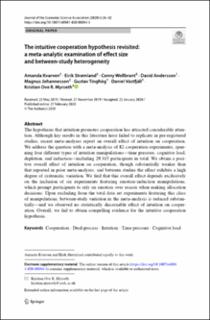The intuitive cooperation hypothesis revisited: a meta-analytic examination of effect size and between-study heterogeneity
Kvarven, Amanda; Strømland, Eirik André; Wollbrant, Conny; Andersson, David; Johannesson, Magnus; Tinghög, Gustav; Västfjäll, Daniel; Myrseth, Kristian
Journal article
Published version

Åpne
Permanent lenke
https://hdl.handle.net/11250/2753215Utgivelsesdato
2020Metadata
Vis full innførselSamlinger
- Department of Economics [287]
- Registrations from Cristin [9487]
Originalversjon
Journal of the Economic Science Association. 2020, 6, 26-42. https://doi.org/10.1007/s40881-020-00084-3Sammendrag
The hypothesis that intuition promotes cooperation has attracted considerable attention. Although key results in this literature have failed to replicate in pre-registered studies, recent meta-analyses report an overall effect of intuition on cooperation. We address the question with a meta-analysis of 82 cooperation experiments, spanning four different types of intuition manipulations—time pressure, cognitive load, depletion, and induction—including 29,315 participants in total. We obtain a positive overall effect of intuition on cooperation, though substantially weaker than that reported in prior meta-analyses, and between studies the effect exhibits a high degree of systematic variation. We find that this overall effect depends exclusively on the inclusion of six experiments featuring emotion-induction manipulations, which prompt participants to rely on emotion over reason when making allocation decisions. Upon excluding from the total data set experiments featuring this class of manipulations, between-study variation in the meta-analysis is reduced substantially—and we observed no statistically discernable effect of intuition on cooperation. Overall, we fail to obtain compelling evidence for the intuitive cooperation hypothesis.
